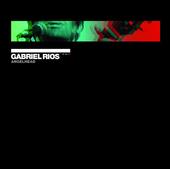If you've ever been to the Caribbean, you're probably familiar with the universe
of "overproof". Those incredible Bacardi or Don Q rums which are more than 100 proof
(they range from 120, 151, 160, to 169 proof!). There's a whole subculture dedicated to experimenting with them; kamikazes that have invented incredible cocktails with names like Liquid Cocaine, Instant Death or Flaming Orgasm.
Well, Gabriel RÃos is the sonic equivalent of these. Listening to him is an intoxicating experience that has the impact of these dangerous drinks (happily without the nefarious effects). Gabriel uses the outburst of the West Indian rhythms and filters it with the technology of contemporary electronic music. There's nothing similar to it in America or Europe.
This might be due to Rios hermetism. He was an outsider in Puerto Rico. As a young lad he
was into punk rock, oblivious to reggaeton and romantic salsa sounds that dominated his Country's musical arena.
Ambitious Puertoricans travel to the US but Gabriel thought it would be a different experience
to be educated in Europe. And there was also a girl, of course ! She came from Belgium and shared some of the music she liked with him : "I was impressed by Deus and its whole saga : Moondog Jr
and Zita Swoon". Compared to the music I listened to in Puerto Rico they were very weird -specially because of their structures and their lyrics- but she told me they were being played on Belgian radio.
Gabriel settled in Gent and while studying art he formed bands such as The Nothing Bastards and L.Santo. hen something happened ; he started to miss Puertorican music such as the "bomba" , "plena" and also "salsa", which was his father's favourite.
This was music that " lived inside my head and that all of a sudden became necessary to me".
His father sent him some classic salsa and other latin music CDs and the songs RÃos composed were no longer "rock" but something completely different.
After a year, he met Jo Bogaert and sparks flew. He learned about the possibilities of electronic music from Bogaert and they decided to make a record together combining Gabriel's Caribbean sound and that of the creator of Technotronic. The result was a record made in a state of grace with naturally flowing inspiration. According to Gabriel:
" Most of the songs blossomed miraculously in the streets, in the shower, in the train.......
If I had my cell phone I'd tape them immediately: otherwise I hummed them until I got home
or in Jo's studio. . There they gave shape to those heaven-sent ideas and they took adventurous decisions.For instance, the rappers thick voice in "Carlitos" or "Badman" is...Gabriel himself
ably treated by Bogaert. This is Alter Ego, a virtual character that comes out from the creative heat that originated "Ghostboy".
"Ghostboy" entices starting from the very cover: a picture of Gabriel's mother.
This is a wild album where the samples come from Willie Colon's records, some of the most intense stuff ever to come out of Spanish Harlem.
The bilingual repertoire of "Ghostboy" is full of light and dark moments, lovers' passion but
also visceral nostalgia, friends that disappeared, the shadow of Armageddon.
Nothing is as innocent as it seems. The voices of "Victor" were recorded in Guatemala and they belong to some "street kids that play at killing each other". And the aural arquitecture is quite
intoxicating: bombastic keyboards and hip-hop bases at the service of carnal rhythms and sticky melodies. Two worlds collide naturally.
"Ghostboy" is an initiation of a journey for his truly in touch with reality artistry.
As an artist he strives to create a difference between his records and his live shows.
When he's on stage he consciously rejects samplers and programmes for the value of live music. These instrumentalists share a vision, a truly determined and hungry "posse". They don't even really need "overproof". Their fire is inside those "grooves" and "montunos" which paint using tropical colours on old Europe's ether canvas.
